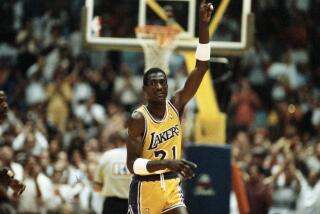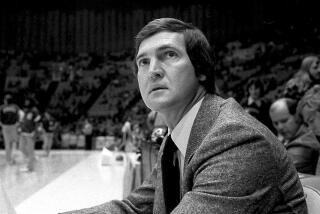He Has Name and Talent for the Game
It’s one thing to wear the purple-and-gold of the Los Angeles Lakers and be the absolute kings of basketball.
It’s one thing to own the town, to walk into any restaurant and have a hush come over the room, to have ticker-tape parades at City Hall.
It’s one thing to be “Magic” and “Kareem” and “Coop” and have traffic stop when you show up, have talk shows begging for you, have a chance to star in new car commercials and make hundreds of thousands of dollars on the side and have Hollywood at your feet.
But, what if you play basketball in this town and nobody even knows your name, never mind your game?
What if you walk in a restaurant and the maitre d’ says, “What did you say the name is again?”
What if you play your heart out every night in front of a lot of empty seats and, in spite of your efforts, the team is going down to its 10th or 11th straight defeat and some joker at courtside leans over and yells: “You ever think of getting a regular job? Why don’t you get into the game?!”
What if you’re not Magic or Kareem, but maybe you’re as good as an A.C. Green or a James Worthy or even Coop but nobody wants to hear about it?
What if you go to a party and they find out you’re a basketball player and right away they say: “You are?! Do you know Magic Johnson?” Or, “What’s Kareem really like?”
If you can get a feel for all these things, you get some idea of what Michael Cage is going through these days.
Michael Cage, it happens, is a professional basketball player, one of the best. He plays on the team called the Los Angeles Clippers, one of the worst.
In a way, it’s like riding around town with the Pope. Everyone wants to know what you think you’re doing there.
Sharing a town with the Lakers is like sharing a scene with Shirley Temple or a stage with Milton Berle or a microphone with Howard Cosell. Lots of luck. Bring a book.
Michael Cage knows all about this. Michael Cage, it so happens, is one of the premier power forwards in basketball.
If he played for the Lakers, he would be doing shoe commercials, getting the best tables in restaurants, he’d have to have his phone unlisted and maybe they would have to bring his car all the way around to the floor of the Sports Arena as they did with Magic Johnson’s the other night after a Clippers-Lakers game.
You couldn’t let Magic wander around loose in that crowd of souvenir-seekers.
Michael Cage was as safe as in his mother’s arms. He didn’t need a bodyguard. He needed a name tag.
The Lakers win a game every night.
The Clippers win a game every month. The Clippers are usually running on the court like a bunch of fat guys chasing a bus. They’re almost always behind and wondering where the ball is.
“We never seem to be able to get any control,” laments their coach, Gene Shue. “We average 97 points a game, we shoot 43% (Thursday night, it was 32%), we generally get outrebounded. That doesn’t get it done in this league.”
None of this has anything to do, really, with Michael Jeffrey Cage.
It’s the first time in his life he hasn’t been associated with runaway success. At West Memphis (Ark.) High where he was all-state, his team went was 30-0 in his senior year and won the state championship. At San Diego State, he was the school’s all-time leader in scoring, rebounding and games played.
Michael Cage will go get the ball for you. Powerful, mobile, fearless, he is second in the league in rebounds, first in offensive rebounds (205). He had nearly 1,000 rebounds last year.
Any team in the league could use a Michael Cage. He would be a magazine cover with the Boston Celtics, he could fit as nicely into the Lakers as any one of their sub-Magic players.
But Michael Cage doesn’t dream. “It’s tough being in the same town with the premier team in the league,” he admits.
“It magnifies your problems when you realize what a difference there is between their team and yours. It’s frustrating to know you’re as good as some other players in the league.
“I’d like to get more notoriety. But I know I’m an integral part of the Clippers’ plans. I’m not going to get traded to Boston or even across town. My job is to be patient, to wait for the team to form around us, to hope it does.”
How hard is it to keep digging when the end of the tunnel stays dark?
“I try for consistent effort. I’m a young veteran (four years) and a leader. I know the young guys are watching me closely. If they see evidence I’m taking the easy way, coasting, or, in any form, it gives them the wrong message.”
The game between the Lakers and the Clippers Thursday night was not your basic Laker-Celtic knuckle biter, but the Clippers managed to hang onto the Lakers’ coattails until Magic Johnson got tired of it and began to put the lights out.
He threw a pass to Mychal Thompson that practically scored itself, he found open men in places where no one else could, he threw in baskets from all over the court and, by the time he was through, the Lakers had thrown in a 66-point second half and turned a 3-point halftime lead into a 31-point final. Magic had sawed the Clippers in half.
After the game, he stood in a small circle of friends, modestly assessing his “triple-double” (18 points, 11 assists, 10 rebounds) when someone asked him about Michael Cage.
“Michael Cage,” said Magic, “is one of the five hardest workers in this league. He never stops working, and especially he never stops working for the rebounds. He commands respect, and you can’t rest with Michael Cage on the floor ‘cause he’s coming for the basketball.”
And, then, Magic Johnson waited while they brought his car around to the dressing room door on the floor of the arena and he got in and someone drove him off.
Michael Cage stood off to one side and watched. Then, he went and got his own car.
More to Read
Go beyond the scoreboard
Get the latest on L.A.'s teams in the daily Sports Report newsletter.
You may occasionally receive promotional content from the Los Angeles Times.










